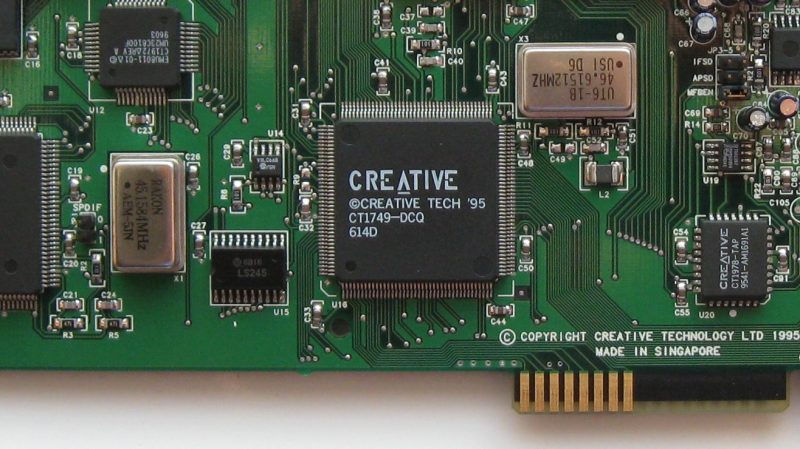Old hardware tends to get less support as the years go by, from both manufacturers and the open-source community alike. And yet, every now and then, we hear about fresh attention for an ancient device. Consider the ancient SoundBlaster sound card that first hit the market 31 years ago. [Mark] noticed that a recent update squashed a new bug on an old piece of gear.
Jump over to the Linux kernel archive, and you’ll find a pull request for v6.16-rc3 from [Takashi Iwai]. The update featured fixes for a number of sound devices, but one stands out amongst the rest. It’s the SoundBlaster AWE32 ISA sound card, with [Iwai] noting “we still got a bug report after 25 years.” The bug in question appears to have been reported in 2023 by a user running Fedora 39 on a 120 MHz Pentium-based machine.
The fixes themselves are not particularly interesting. They merely concern minutiae about the DMA modes used with the old hardware. The new updates ensure that DMA modes cannot be changed while the AWE32 is playing a PCM audio stream, and that DMA setups are disabled when changing modes. This helps avoid system lockups and/or ugly noises emanating from the output of the soundcard.
It’s incredibly unlikely this update will affect you, unless you’re one of a handful of users still using an ISA soundcard in 2025. Still, if you are — and good on you — you’ll be pleased someone still cares about your user experience. Meanwhile, if you’re aware of any other obscure old-school driver updates going on out there, don’t hesitate to let us know on the tips line. Want to relive your ISA card’s glory days? Plug it into USB.
Image credit: Gona.eu, CC BY-SA 3.0
[Thanks to Meek Mark for the tip!]
















Fedora 39 on a 32-bit x86 CPU ?
I thought Fedora had dropped support for 32-bit x86 hardware platforms several releases before that .
it states Fedora 39 version on some of the dependencies on the bug report.
since Fedora is largely open source, if you have a compiler you can target any architecture you want, would be not trivial but is entirely doable, particularly if you are running linux on 90s PC hardware
Indeed, goid points. This was reported upstream to Kernel folks and the reporter might just be using Fedora source repos as a convenient package repository (I suspect there is a need to compile the packages from source with a target that will allow them to run on a P54 variant).
At this point, I’m not all that sure that it all qualifies to be referred to as “Fedora 39” rather than a Fedora 39 derived (at least in part) x86 32-bit rebuild in the article, but that’s more a question of semantics.
Quick info: The AWE32, AWE64 and the SB32 are variants of the (in)famous Sound Blaster 16.
They just added an EMU 8000 wavetable synthesizer, basically. Some variants are ISA Plug&Play, as well.
So while the fix seems funny at first, we must remember that the SB16 was the final model of the Sound Blaster line*.
It was the standard in Pentium systems, so to say. Both real and emulated.
And the latter makes it so important, maybe.
If you’re virtualizing an old “ISA PC” system type, then the SB16 is the prefered sound device.
Along with OPL3 FM synth and MPU-401/Gameport, ideally.
DOSBox, Virtualbox and Virtual PC 2007 do provide SB16 emulation, too, for example.
(*Sure there also were WSS, PAS16, GUS and EWS64 etc, but Sound Blaster was king.)
Assuming the emulations have emulated these DMA quirks as well. I’m not sure why anyone would bother
I loved my AWE64 and only stopped using it because ISA disappeared from motherboards. It’s been a long time since I compared it’s sound to anything modern but I’d like to try it.
Overdriiving an aux input yielded a harsh but popular distortion. The floor noise with dithering and quantization gave a unique fuzzy character. Not great fidelity by todays standards, used by nearly everyone for a time.
This is great!! I’m one of the few that does occasionally installs a recent *nix on an early Pentium system, since it is a great way to create hard drive images for pre-LBA drives!!
Even better, plug it into an ISA-to-LPC adapter.
https://www.vogons.org/viewtopic.php?t=93291
i’m not going to do the research but in my experience with this sort of thing, it’s not that the bug has been unreported for 25 years but rather that it was introduced during those years. maintaining code is hard.
Designed in Stillwater Oklahoma and made in Singapore. That’s a bygone era. . kicker speakers was created in Stillwater in the same time frame